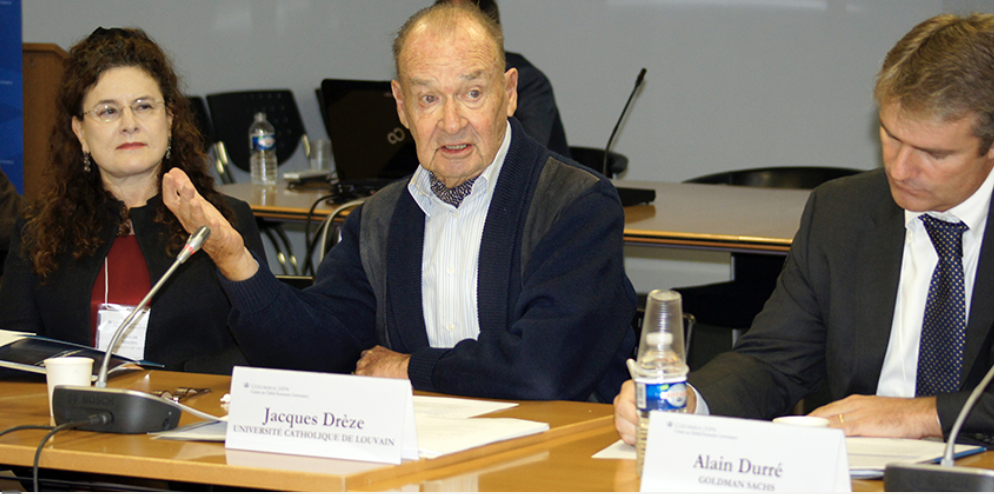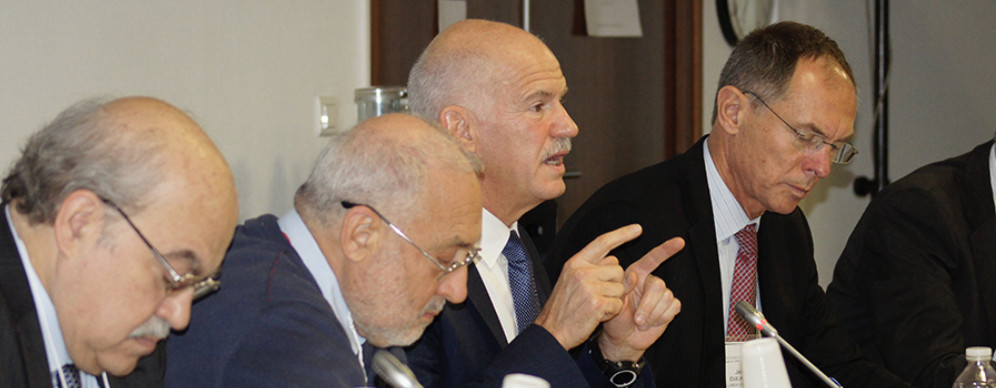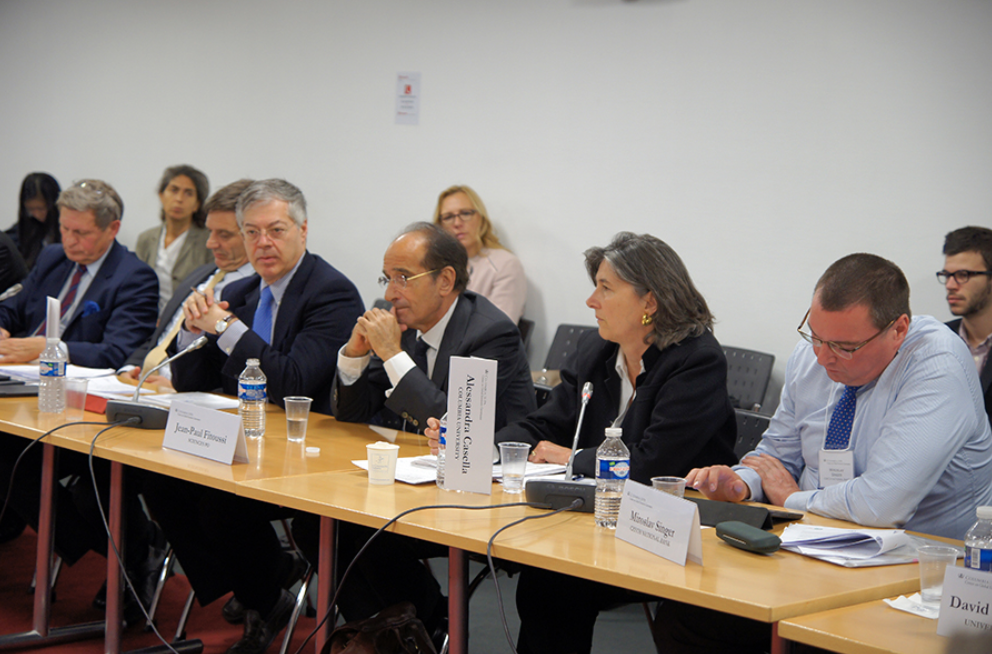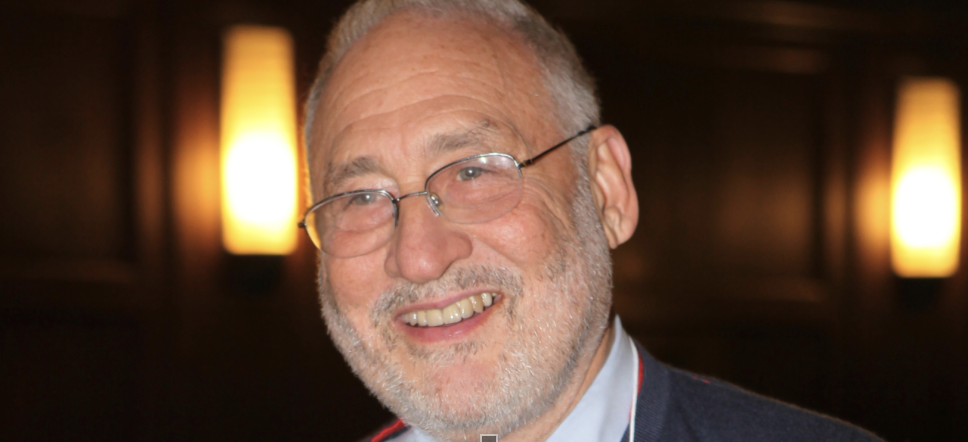The Role of the State in Economic Growth - Paris
Strategies for Growth: The Changing Role of the State
As part of Columbia University President's Global Initiative, the Center on Global Economic Governance (CGEG) is conducting policy-oriented research into Strategies for Growth: The Changing Role of the State. This three-year project is being undertaken in collaboration with the Columbia global centers in Europe (Paris), Latin America (Rio de Janeiro), and East Asia (Beijing). The first event of the project is the following roundtable conference in Paris.
The Role of the State in Economic Growth in Europe
October 5-6, 2014
Paris, France
Organized with the Columbia Global Centers | Europe (Paris) and Sciences Po
In cooperation with Alliance, the International Economic Association, and the New World Forum
- Please click here for the Policy Brief Series from this conference (.pdf) -
- Media Coverage on Radio VL: "Quelle stratégie économique pour l’Europe?" (in French) -
DAY 1 - OCTOBER 5, 2014 | Columbia Global Centers | Europe (Paris), 4 Rue de Chevreuse, 75006 Paris
18:00
Registration and Seating
18:45
Welcome by Jan Svejnar – Professor and Director of CGEG, Columbia University
19:00
Dinner
19:30
Conference Opening Keynote Address – Michel Sapin, Minister of Finance and Public Accounts, France
20:15
Dessert and Discussion
21:00
Closing Remarks
DAY 2 - OCTOBER 6, 2014 | Sciences Po – CERI, 56, rue Jacob, 75006 Paris
On Monday, October 6, the conference will be run as a roundtable discussion with participants making short targeted interventions. The day will be divided into four consecutive sessions. In each session, two or three participants will each give a 3-5 minute set of introductory remarks to start the discussion. In Session I, governors of the Croatian, Czech and Slovenian central banks will also provide a brief central bank perspective, and Jacques Drèze will briefly present a Drèze-Durré proposal for mutual insurance of idiosyncratic macroeconomic risks among EMU countries. All sessions will examine Europe in a global comparative perspective. The focus will be on the role played by government and supranational European institutions in stimulating economic growth and on possible alternative approaches.
8:45
Arrival, Coffee and Opening Remarks
- Jean-Pierre Landau, Professor at Sciences Po
- Jan Svejnar, James T. Shotwell Professor of Global Political Economy at Columbia University
9:00-11:00
Session I: Structure, Institutions and the Role of the State in Economic Growth – Setting the Stage
This session is to identify key internal and external issues facing Europe in its quest for economic growth. Are there flaws in the very structure of the EU and/or Eurozone? Is there a need for a fiscal union and what does it imply for political union and competence allocation between the EU and member states? What are the implications for EU governance of some countries not intending to join the euro area and some regions wanting autonomy or independence? Which policies have been most deleterious and which ones most helpful for growth? What has been the role of external factors? Is there a new role for the state? Should there be a new openness to industrial policy? A change in ECB mandate? A European wide SME loan fund? A banking union? Does the structure of Europe inhibit the ability to engage in redistributive taxation, leading to more inequality, and hence lower growth? Should Europe introduce the Drèze-Durré mutual insurance of idiosyncratic macroeconomic risks among EMU countries and transfer to EMU the responsibility for demand stimulation through public and private investment and the provision of unemployment insurance at the EU level?
Moderator: Jan Svejnar
- Initial Interventions:
- André Sapir, University Professor at the Université libre de Bruxelles (ULB), Senior Fellow of Bruegel, and Research Fellow of the Centre for Economic Policy Research (CEPR)
- Leszek Balcerowicz, Professor of Economics and Head of the Department of International Comparative Studies at the Warsaw School of Economics
- George A. Papandreou, Former Prime Minister of Greece, Member of the Hellenic Parliament, and President of Socialist International
Central Banker Perspectives:
- Boštjan Jazbec, Governor of the Central Bank of Slovenia
- Miroslav Singer, Governor of the Czech National Bank
- Boris Vujčić, Governor of the Croatian National Bank
Presentation of a proposal for mutual insurance of idiosyncratic macroeconomic risks among EMU countries:
- Jacques Drèze, Professor Emeritus and Researcher at CORE at the Université catholique de Louvain
11:00-11:15
Break
11:15-12:30
Session II: Industrial Policy, Financial Sector, Employers and Workers
Should Europe have a more proactive industrial policy or is creating the right environment all that is needed? Do some countries (e.g., in Scandinavia) deploy public resources more efficiently than others and if so, how? How can banks and other financial institutions be made more efficient in allocating capital? Is it better or worse to have more flexible labor markets? Is there a need for an alternative system of industrial and labor relations? Do anti-inequality and welfare policies promote or retard growth? Do pro-gender policies and regional policies promote labor force participation and growth?
Moderator:
- Sir Howard Davies, Chairman of the Phoenix Group and the UK Airports Commission
Initial Interventions:
- Arnoud Boot, Professor of Corporate Finance and Financial Markets at the University of Amsterdam and Co-director of the Amsterdam Center for Law & Economics (ACLE)
- Sean Safford, Associate Professor, Director of the Master in Public Affairs programme, and Researcher at the Centre de Sociologie des Organisations, at Sciences Po
12:30-14:00
Lunch and Keynote Address – Joseph E. Stiglitz, University Professor at Columbia University and winner of the 2001 Nobel Memorial Prize in Economic Sciences
14:00-15:15
Session III: Education, Research & Innovation
How has Europe done in terms of education, research and innovation? Should the state do more to stimulate quality education, research and innovation? Which approaches are more and which ones less conducive to achieve sustainable and inclusive economic growth? Is growth per se a worthwhile goal?
Moderator:
- Jean Pisani-Ferry, Commissioner-General for Policy Planning, reporting to the French Prime Minister in Paris, and Professor of Economics and Public Management at the Hertie School of Governance
Initial Interventions:
- Stefano Scarpetta, Director for Employment, Labour and Social Affairs at the OECD
- Dalia Marin, Chair in International Economics at the University of Munich
15:15-15:30
Break
15:30-16:45
Session IV: Europe and Global Institutions -- New Models of Governance?
Should individual states and EU/Euro institutions interact differently with supranational/global institutions such as the G20, IMF, World Bank, WTO, UN, OECD? Are new institutions or new roles for existing institutions needed?
A continuation of the discussion of the Drèze-Durré mutual insurance of idiosyncratic macroeconomic risks among EMU countries.
Moderator:
- Jean-Paul Fitoussi, Professor Emeritus at Sciences Po and LUISS Guido Carli University and Chairman and Co-founder of the New World Forum
Interventions:
- Alessandra Casella, Professor of Economics and Director of the Experimental Laboratory in the Social Sciences at Columbia University
- Francesco Saraceno, Senior Economist at Sciences Po's Observatoire français des conjonctures économiques (OFCE)
16:45
Closing Remarks (A light public reception will follow the closing)




